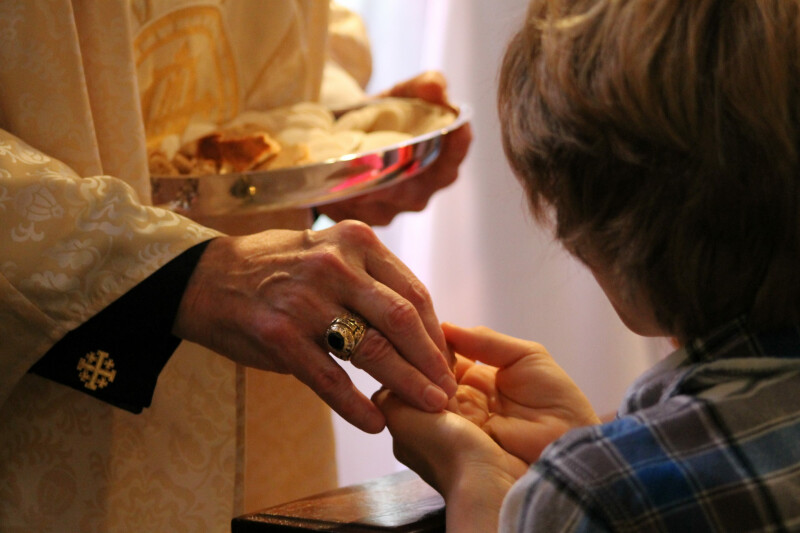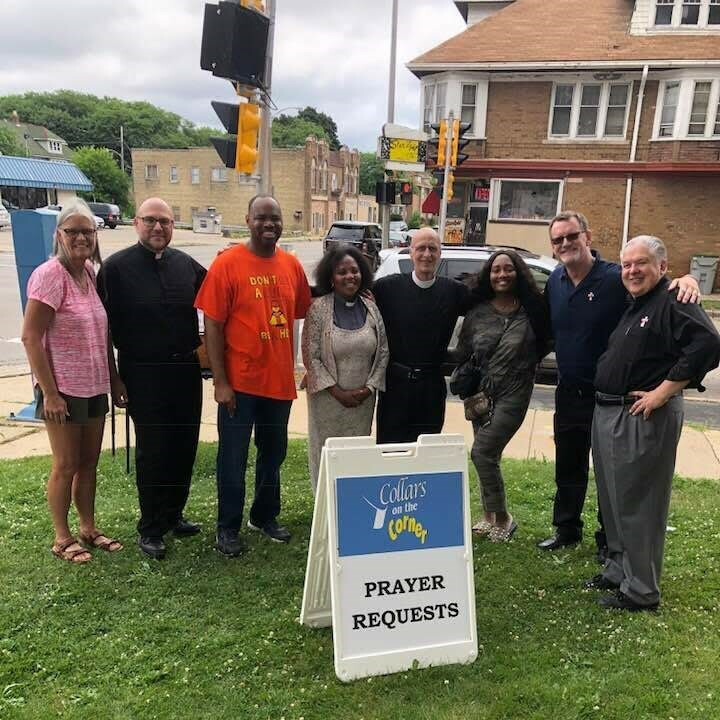Ask a Theologian: Holy Communion

Dear Theologian,
When I was growing up in The Episcopal Church, the Book of Common Prayer contained an order of service for “the Lord’s Supper or Holy Communion,” although some parishes preferred to call it “the Mass.” At present, the prayer book calls it “the Holy Eucharist.”
Is there some important spiritual or theological meaning in this variety of names? How are they related to one another?
Bewildered by All the Changes
Dear Bewildered,
What we do with bread and wine on Sunday morning is the heart and center of Christian existence. That it should be called by several different names is perhaps not so surprising, when one considers the long and varied history of Christianity. Each of the names highlights a somewhat different aspect of an infinitely rich mystery.
Although this central ritual of Christian faith has taken on many different cultural forms—some quite elaborate—its essential structure is actually simple. The celebrant takes bread and wine, says the great blessing prayer, breaks the bread, and distributes the bread and wine to all the participants.
We might characterize this simple sequence of actions as a symbolic meal, with the elements of food and drink reduced to a small, token amount for each person. But what does it mean?
Its meaning is to be found in its origins. When the first Christian believers began gathering in the name of the crucified and risen Jesus, they would share meals together in the Jewish way. At the beginning, they would say a blessing over the bread, then break and share it. At the end of the meal, they would bless a cup of wine and share it. In this familiar pattern of interaction, they were remembering Jesus and relating to him as present in the power of the Spirit.
In one of the earliest New Testament texts we have (Paul’s First Letter to the Corinthians, written perhaps around 54 ad), we find a precious interpretation of what was then being called “the Lord’s supper.” Paul attributes the origin of this ritual to Jesus himself “on the night when he was betrayed” (1 Cor 11:23-26) in a passage which is strikingly paralleled in the later writings that we call the Gospels (Lk 22:14-20, Mt 26:26-28, Mk 14:22-25).
According to this account, Jesus took the traditional Jewish table ritual and gave it a new, unexpected meaning. As they ate the one bread that he blessed and broke (and later, as they drank from the one cup of wine that he blessed), they were given a share in his self-giving sacrifice that was about to be made (“my body given for you ... my blood poured out for many”). The basic meaning of this symbolic action, therefore, was about his disciples participating in the great mystery of his sacrificial death.
Those who participate in the Church’s ongoing celebration of this mystery are opening themselves to being united with the crucified and risen Jesus. Eating the consecrated bread and drinking the consecrated wine in the attitude of reverent faith is an act of intimate communion with the Lord. It is rightly called Holy Communion.
But there is another reason for using the word “communion” for this ritual of sharing together in the great mystery of Christ. The New Testament word koinonía, often translated as “communion” or “fellowship,” means precisely “having something in common, sharing in something.” It is by sharing together in the Christ mystery that many human beings, in all their diversity, are gathered into communion with one another.
This is celebrated and, indeed, enacted again and again, whenever believers gather for the symbolic meal of bread and wine, blessed and shared in Christ’s name. The “communion” of the Church is continually created anew when this happens. The ritual thus has a “Church-forming” function.
What about “the Mass”? This name, used by Roman Catholics as well as many Anglo-Catholics, is derived from the Latin word missa in the ancient words of dismissal or “sending forth” at the end of the celebration. (“Ite, missa est!”) In traditional Roman Catholic doctrine, the word occurs typically in the phrase, “the holy sacrifice of the Mass.”
In this Catholic understanding, the mystery of Christ’s death is interpreted as the perfect sacrifice (of himself) by which he reconciles sinful humanity with God. Offered once and for all on Calvary, this same eternal sacrifice is made present sacramentally in every celebration of the Mass—so that the participants can share in its benefits and unite themselves to Christ in their own self-offering. Rightly understood, this Catholic doctrine is quite compatible with the Anglican understanding. [1]
What about the name “Holy Eucharist,” which is used widely today by Anglicans and others? “Eucharist” is from the Greek word that means “giving thanks,” a word still used in modern Greek as the everyday expression for “thank you!” When addressed to God, the word expresses the glad recognition that everything is grace (sheer, unmerited gift from God).
When the Christian community gathers in the name and power of Jesus, its fundamental stance is this joyous, deeply grateful praise of God. It is expressed richly in the blessing prayer chanted or recited by the celebrant of the Eucharist, which is called “The Great Thanksgiving.” We praise and thank God for creating the entire universe, including ourselves, and above all for redeeming us through the life, death, and resurrection of Jesus.
Our gratitude and praise pass over naturally into the humble offering of ourselves—our life, our energy, our talents—to be spent for God’s purposes. And we do all this consciously in union with Christ our brother and Lord. It is summed up in the final words of the great prayer: “By him, and with him, and in him, in the unity of the Holy Spirit, all honor and glory is yours, Almighty Father, now and for ever. AMEN.” [2]
All this meaning is included in the sacramental event which then follows. Uniting ourselves with Christ as we eat the one bread and drink from the one cup, we are also united with one another, to be Christ’s Body in this world. What we are doing is, at the same time, “Holy Communion,” “Sacrifice” and “Holy Eucharist.”
Faithfully,
The Theologian
[1] Cf. Rite I: “Accept this our sacrifice of praise and thanksgiving, whereby we offer and present unto thee, O Lord, our selves, our souls and bodies.” BCP, p. 342.
[2] BCP, p. 369.
The Rev. Wayne L. Fehr writes a monthly column for the diocesan newsletter called "Ask a Theologian," answering questions from ordinary Christians trying to make sense of their faith. You can find and purchase his book "Tracing the Contours of Faith: Christian Theology for Questioners" here.

